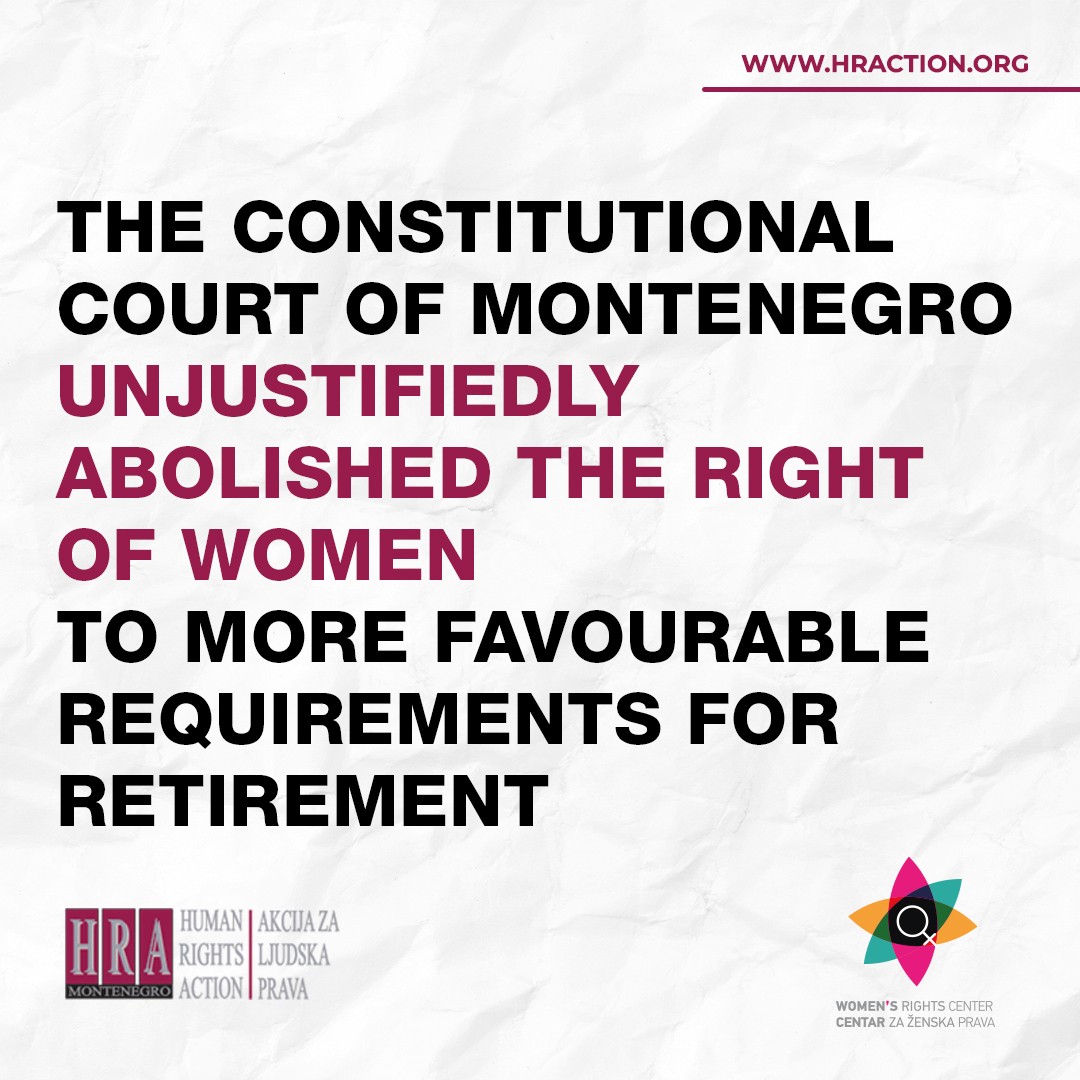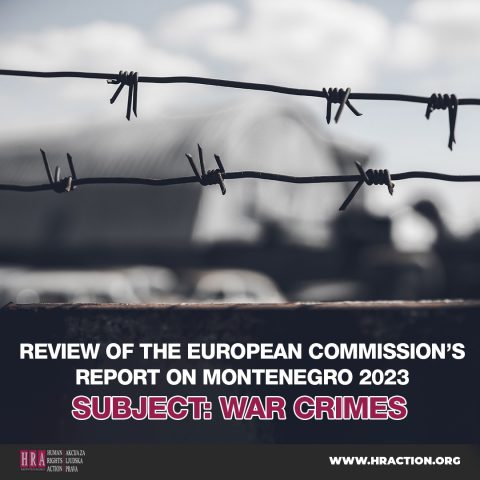
THE CONSTITUTIONAL COURT OF MONTENEGRO UNJUSTIFIEDLY ABOLISHED THE RIGHT OF WOMEN TO MORE FAVOURABLE REQUIREMENTS FOR RETIREMENT
27/10/2023
REVIEW OF THE EUROPEAN COMMISSION’S REPORT ON MONTENEGRO FOR THE YEAR 2023 – SUBJECT: JUSTICE
09/11/2023REVIEW OF THE EUROPEAN COMMISSION’S REPORT ON MONTENEGRO 2023 – SUBJECT: WAR CRIMES

The Human Rights Action (HRA) supports the assessment of the European Commission (EC) that Montenegro must improve its approach to the investigation and prosecution of war crimes in accordance with international humanitarian law and make it more proactive. The country has been subjected to the same criticism for the last 10 years. There is only one war crime trial pending, based the indictment that was brought two years ago because Bosnia and Herzegovina forwarded the case to Montenegro. There have been no new indictments and no new investigations since.
This year too, it was assessed that the state made only limited progress in implementing the War Crimes Prosecution Strategy.
HRA hereby points out that the Special State Prosecutor’s Office (SSPO) has not yet reviewed old cases in which verdicts were handed down in violation of international law, in accordance with the Strategy, nor has the same prosecutor’s office initiated any investigations or filed any indictments since the Strategy was adopted in 2015 regarding command responsibility, complicity and inciting or aiding a war crime, which is why it was necessary to point out these omissions once again.
The EC welcomed the continuation of good regional and international cooperation and the positive step forward in relation to the domestic legal framework for the prosecution of war crimes. However, HRA notes that cooperation between Montenegro and the countries of the region regarding war crimes is not good enough. The problems are the cases in which legal regulations and bilateral agreements between countries cannot resolve the existing legal situation.
As we have repeatedly pointed out, regional cooperation did not contribute to bringing those convicted of war crimes against the civilian population in the Klapuh case to justice, although 31 years have passed. The Republic of Serbia did not extradite one of these persons, Zoran Vuković, to Montenegro, and Bosnia and Herzegovina is not interested in prosecuting the second and third – Radomir Kovač and Zoran Simović. Previous Minister of Justice, Marko Kovač, never said whether he ever insisted that his colleague from Serbia, Minister Maja Popović, act in accordance with the provisions of the interstate agreement and make a decision on the extradition of Vuković.
Also, although the indictment against the citizen of Montenegro, Ranko Radulović for the crime against humanity committed in Foča in 1992 was partially confirmed back in September 2020 before the Court of Bosnia and Herzegovina, the trial in this case has not started, nor is it expected to. For unknown reasons, the case was not forwarded to Montenegro, and Radulović cannot attend the trial in BiH because he is currently being tried in Montenegro.
The situation with the case against 10 officers of the former YNA is the same. At the end of 2022, the conditions for holding a hearing before the County Court in Split have not been met. The defendants are accused of failing to prevent the behaviour of their units during the aggression against the Dubrovnik area in 1991 and 1992, contrary to the Geneva Conventions. Their extradition to the Croatian authorities is not possible because the bilateral Extradition Treaty between Montenegro and the Republic of Croatia does not allow the extradition of their own citizens on war crimes charges, and the Croatian judiciary, for unknown reasons, failed to not submit the evidence in these cases to Montenegro and Serbia for processing.
Additionally, for more than 16 years, the County State Attorney’s Office in Split did not inform the public or the prosecutor’s office in Montenegro about the results of the investigation into the murder of captured military reservists from Montenegro in the “Lora” military investigation center in Split. The reasons that prevent the prosecution of those responsible for the killing of Montenegrin prisoners of war are unknown as well.
The above cases indicate that regional cooperation cannot be positively evaluated in the current context. They emphasise the need for significantly greater efforts and engagement of both our authorities and the authorities of other countries in the region so as to achieve better cooperation in the prosecution of war crimes.
Finally, HRA points out that, in its report, the EC unfortunately failed to criticise the discriminatory approach to prescribing the “civilian victim of war” institute, which found its way into the provisions of the adopted Draft Law on Amendments and Supplements to the Law on Veterans and Disability Protection. This legal institute, which implies the right to monetary compensation, is prescribed in such a way that the right can be exercised only by the victims of the armed conflict with NATO in Montenegro, i.e. the families of victims in Murino, but not the other families of civilian victims from Montenegro who suffered as a result of armed conflicts in Croatia, Bosnia and Herzegovina or Kosovo after the end of the state of war.







 English
English